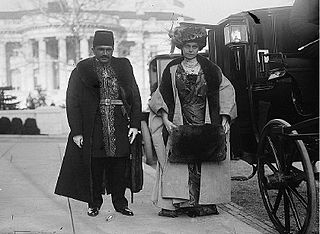
Morocco is a member of the United Nations and belongs to the African Union, Arab League, Arab Maghreb Union (UMA), Organisation of Islamic Cooperation (OIC), the Non-Aligned Movement and the Community of Sahel-Saharan States (CEN_SAD). Morocco's relationships vary greatly between African, Arab, and Western states. Morocco has had strong ties with the West in order to gain economic and political benefits. France and Spain remain the primary trade partners, as well as the primary creditors and foreign investors in Morocco. From the total foreign investments in Morocco, the European Union invests approximately 73.5%, whereas, the Arab world invests only 19.3%. Many countries from the Persian Gulf and Maghreb regions are also getting more involved in large-scale development projects in Morocco.

Ambassadors of the United States are persons nominated by the president to serve as the country's diplomatic representatives to foreign nations, international organizations, and as ambassadors-at-large. Under Article II, Section 2 of the U.S. Constitution, their appointment must be confirmed by the United States Senate; while an ambassador may be appointed during a recess, they can serve only until the end of the next session of Congress, unless subsequently confirmed.

A chargé d'affaires, plural chargés d'affaires, often shortened to chargé (French) and sometimes in colloquial English to charge-D, is a diplomat who serves as an embassy's chief of mission in the absence of the ambassador. The term is French for "charged with business", meaning they are responsible for the duties of an ambassador. Chargé is masculine in gender; the feminine form is chargée d'affaires.

The Tangier American Legation (Arabic: المفوضية الأميركية في طنجة; French: Légation américaine de Tanger), officially the Tangier American Legation Institute for Moroccan Studies (TALIMS), is a building in the medina of Tangier, Morocco. Formerly the chancery of the United States diplomatic mission to Morocco, it was the first American public property abroad and is the only U.S. National Historic Landmark located in a foreign country.

Relations between the Kingdom of Morocco and the United States of America date back to the American Revolutionary War (1775–1783) and specifically since 1777 when the sultan Mohammed ben Abdallah became the first monarch to help the United States. Morocco remains one of America's oldest and closest allies in North Africa, a status affirmed by Morocco's zero-tolerance policy towards Al-Qaeda and their affiliated groups. Morocco also assisted the U.S. Central Intelligence Agency with questioning al-Qaeda members captured in Afghanistan, Iraq, and elsewhere during the administration of 43rd President George W. Bush, who designated the country as a Major non-NATO ally.

This is a summary history of diplomatic relations of the United States listed by country. The history of diplomatic relations of the United States began with the appointment of Benjamin Franklin as U.S. Minister to France in 1778, even before the U.S. had won its independence from Great Britain in 1783.








